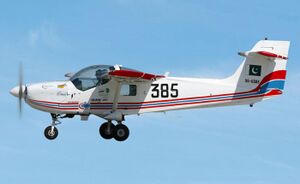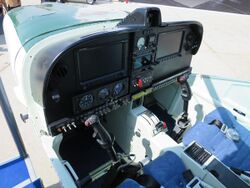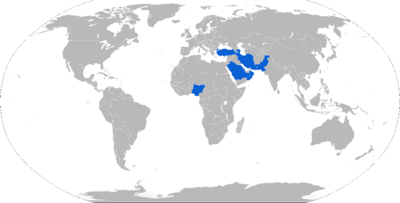Engineering:PAC MFI-17 Mushshak
| MFI-17 Mushshak Super Mushshak | |
|---|---|

| |
| A PAC MFI-17 Mushshak in flight | |
| Role | Basic training aircraft, Light attack aircraft |
| National origin | Pakistan |
| Manufacturer | Pakistan Aeronautical Complex |
| First flight | 1981 |
| Status | In service |
| Primary users | Pakistan Air Force Turkish Air Force Islamic Republic of Iran Air Force Royal Saudi Air Force |
| Produced | 1981–present |
| Number built | 488 |
| Developed from | Saab Safari |
The PAC MFI-17 Mushshak (Urdu: مشاق) (English: Proficient) is a license-built fixed-gear basic trainer aircraft manufactured by PAC. An improved version of the Saab Safari (MFI-15), the MFI-17 is manufactured in Kamra, Pakistan, by Pakistan Aeronautical Complex (PAC). Built to Mil-Spec and fully aerobatic, it is used for training, towing and other ground support roles. An upgraded version, the PAC Super Mushshak, has also been produced by PAC.
As of 2022, there were 477 MFI-15/17/395 in use, making it one of the most commonly used training aircraft in the world.[1]
Development
The MFI-15 Safari and MFI-17 Supporter were created from Saab's adaptation of the MFI-9 Junior for basic training for civil and military operators.
In 1968 Saab began work on its MFI-15, based on the MFI-9 but with some design changes. Foremost of the changes in the Saab built MFI-15 prototype was the 120 kW (160shp) Lycoming IO-320 piston engine. Like the MFI-9, the MFI-15 retained the unusual braced, mid-mounted and slightly forward-swept wing and rearward-hinged canopy, offering good all-around vision. The prototype made its maiden flight on June 11, 1969. Follow-up testing of the MFI-15 resulted in a more powerful IO-360 engine, while the horizontal tail was relocated to prevent it being damaged by thrown up debris. The first flight of this modified form was in February 1971.
Sold as the MFI-15 Safari, most went to civil customers, however Sierra Leone and Norway took delivery of Safaris for military pilot training. To improve the Safari's military market appeal, Saab developed the MFI-17 Supporter, fitted with six underwing hardpoints for light and practice weaponry, giving it weapons training and light COIN capabilities. First flight was on July 6, 1972. Important were Denmark and Zambia. Production ended in the late 1970s after about 250 Safaris and Supporters had been built, mostly for civil customers.
Pakistan has taken delivery of 18 Supporters, while 92 have been assembled locally by PAC from knocked down kits and a further 149 were built locally by PAC. It is named Mushshak ("Proficient") in Pakistani service. In 1981, Pakistan acquired sole manufacturing rights of the Supporter. The development of the MFI-395 in 1995 initiated by the then-managing director of AMF, Air Cdr Muhammad Younas. The aircraft was built by upgrading the MFI-17 with an advanced 260 hp engine, electrical instruments, dual flight control systems and a Bendix RSA fuel injection system.
As of 2022, there were 477 MFI-15/17/395 in use, making it one of the most commonly used training aircraft in the world.[1]
Design
Fitted with an American 260 hp engine, cockpit air conditioning, electrical instruments, and electric/manual elevator and rudder trim, the aircraft has been developed to meet FAR part 23 certification in normal, utility and aerobatics categories. It has a spacious side-by-side cockpit allowing good contact between the pilot and the co-pilot/observer or between the student and the instructor.
Variants
- MFI-17 Mushshak
- MFI-395 Super Mushshak — Pakistan Aeronautical Complex unveiled a light attack variant of the Super Mushshak in March 2019. The aircraft is capable of launching Barq laser-guided and anti-tank missiles.[2][3][4] The Super Mushshak is in use by several countries, including the Pakistan Air Force , Azerbaijani Air Force and the Nigerian Air Force .
Operators
 Azerbaijan
Azerbaijan
 Iran
Iran
- Iran Air Force – 25[7]
 Iraq
Iraq
- Iraqi Air Force - 12 MFI-395 Super Mushshak (4 delivered, 8 on order). 2nd batch of two aircraft delivered on 19 April 2023 to 202nd Training Squadron at Balad Air Base, Iraq.[8]
 Nigeria
Nigeria
- Nigerian Air Force – 10 delivered as of January 2018.[9] Nigeria temporarily operated four Pakistani Air Force Super Mushshaks for early training.[10] The contract included the deployment of Pakistani pilots and technicians to assist the Nigerians.[11]
 Oman
Oman
 Pakistan
Pakistan
- Approximately 337 operational with the Pakistan Armed Forces[13] - 217 with Pakistan Army, 120 Super Mushshak with Pakistan Air Force (4 Super Mushshak were loaned temporarily to Nigeria)
 Qatar
Qatar
- Qatar Emiri Air Force - 8 on order, first batch of 4 delivered in July 2017[14][15][16]
 Saudi Arabia
Saudi Arabia
 Syria
Syria
 Turkey
Turkey
- Turkish Air Force – 52 Super Mushshaks ordered,[19][20] the first three delivered in late October 2022.[21]
Specifications (MFI-17 Mushshak)
Data from Jane's All the World's Aircraft 1988–89,[22] Jane's All The World's Aircraft 1993–94,[23] Pakistan Aeronautical Complex,[24] Jane's All The World's Aircraft 2003–2004[25]
General characteristics
- Crew: 2-3
- Length: 7 m (23 ft 0 in)
- Wingspan: 8.85 m (29 ft 0 in)
- Height: 2.6 m (8 ft 6 in)
- Wing area: 11.9 m2 (128 sq ft)
- Airfoil: NACA 23012 mod[26]
- Empty weight: 646 kg (1,424 lb) equipped
- Max takeoff weight: 1,200 kg (2,646 lb) normal
- 1,125 kg (2,480 lb) utility
- 900 kg (1,984 lb) aerobatic
- Powerplant: 1 × Textron Lycoming IO-360-A1B6 4-cylinder air-cooled horizontally-opposed piston engine, 149 kW (200 hp)
- Propellers: 2-bladed Hartzell HC-C2YK-4F/FC7666A-2, 1.88 m (6 ft 2 in) diameter constant-speed metal propeller
Performance
- Maximum speed: 236 km/h (147 mph, 127 kn) at sea level and 1,125 kg (2,480 lb)
- Cruise speed: 210 km/h (130 mph, 110 kn)
- Stall speed: 100 km/h (62 mph, 54 kn)
- Never exceed speed: 365 km/h (227 mph, 197 kn) at 1,125 kg (2,480 lb)
- Endurance: 5 hours 10 minutes at 65% power, at sea level, with 10% fuel reserve
- Service ceiling: 4,100 m (13,500 ft)
- g limits:
- +4.4 -1.76 (utility MTOW)
- +6 -2 (aerobatic MTOW)
- Rate of climb: 5.2 m/s (1,020 ft/min)
- Time to altitude: 1,830 m (6,004 ft) in 9 minutes 18 seconds
Armament
- Hardpoints: 6× under-wing, maximum external load 300 kg (660 lb) total
- Possible loads:
- 2× 7.62 mm machine gun pods
- 2× 75 mm unguided rocket pod (7 rounds)
- 4× 68 mm unguided rocket pod (7 rounds)
- 6× wire-guided anti-tank missiles (ATGMs)
- Barq Air To Ground Guided Missiles
See also
Related development
References
- ↑ 1.0 1.1 "2022 World Air forces". p. 11. https://www.flightglobal.com/download?ac=83735. "Flight International ranked it as the 6th most commonly used after the T-6, F-16, Hawk, T-38 and L-39."
- ↑ "Pakistan develops super Mushak combat aircraft". Islamabad. 19 March 2019. https://www.pakistantoday.com.pk/2019/03/18/pakistan-develops-super-mushak-combat-aircraft/.
- ↑ "Pakistan develops version of trainer aircraft that can fire missiles". 19 March 2019. https://www.theweek.in/news/world/2019/03/19/pakistan-version-aircraft-missiles.html.
- ↑ "Pakistan Unveils Light Attack Super Mushak Turboprop Aircraft". 19 March 2019. http://www.defenseworld.net/news/24490.
- ↑ "Azerbaijan to buy 10 Super Mushshak aircraft from Pakistan". Islamabad. 27 July 2017. https://www.thenews.com.pk/latest/219393-Azerbaijan-to-buy-10-Super-Mushshak-aircraft-from-Pakistan.
- ↑ Khan, Bilal (27 July 2017). "Azerbaijan orders 10 Super Mushshak trainers from Pakistan". http://quwa.org/2017/07/27/azerbaijan-orders-10-super-mushshak-trainers-pakistan/.
- ↑ International Institute for Strategic Studies (15 February 2020). The Military Balance 2020. London, England: Routledge. p. 351. ISBN 9780367466398.
- ↑ "First batch of Iraqi Air Force Super Mushshak delivered". https://www.scramble.nl/military-news/first-batch-of-iraqi-air-force-super-mushshak-delivered.
- ↑ Cherisey, Erwan de (9 December 2016). "Nigerian Air Force commissions first Super Mushshak trainers". Paris: IHS Jane's. http://www.janes.com/article/66127/nigerian-air-force-commissions-first-super-mushshak-trainers.
- ↑ Warnes, Alan (5 December 2016). "Nigeria receives first Super Mushshak". FlightGlobal. https://www.flightglobal.com/news/articles/nigeria-receives-first-super-mushshak-432103/.
- ↑ "Nigeria To Acquire Super Mushshak Aircraft From Pakistan". July 2016. https://www.defensenews.com/global/mideast-africa/2016/07/01/nigeria-to-acquire-super-mushshak-aircraft-from-pakistan/.
- ↑ International Institute for Strategic Studies (25 February 2021). The Military Balance 2021. London, England: Routledge. p. 359. ISBN 9781032012278.
- ↑ "Mushshak Trainer Aircraft". http://defence.pk/threads/mushshak-trainer-aircraft.299684/#ixzz4NW7jEjzc.
- ↑ "Qatar buys Super Mushshak trainers from Pakistan". Dawn News. 23 June 2016. http://www.dawn.com/news/1266743/qatar-buys-super-mushshak-trainers-from-pakistan/.
- ↑ "Qatar Signs Contract to Purchase "Super Mushshak" Trainer Aircraft from Pakistan". Qatar News Agency. 25 June 2016. http://www.qna.org.qa/en-us/News/16062515210037/Qatar-Signs-Contract-to-Purchase-Super-Mushshak-Trainer-Aircraft-from-Pakistan.
- ↑ Binnie (20 July 2017). "Qatar receives first Super Mushshak trainers". http://www.janes.com/article/72477/.
- ↑ "MFI-395 Super Mushshak Trainer Aircraft". https://www.airforce-technology.com/projects/mfi-395-super-mushshak-trainer-aircraft/.
- ↑ "World Air Forces 2023". Flightglobal Insight. 2023. https://www.flightglobal.com/download?ac=90688. Retrieved 22 April 2023.
- ↑ "Pakistan to supply 52 Super Mushshak jets to Turkey - Pakistan - Dunya News". http://dunyanews.tv/en/Pakistan/362241-Pakistan-to-supply-52-Super-Mushshak-jets-to-Turke.
- ↑ Khan, Bilal (23 November 2016). "Ideas 2016: Turkey Inks 52 Super Mushshak Deal with Pakistan Aeronautical Complex". http://quwa.org/2016/11/23/ideas-2016-turkey-inks-52-super-mushshak-deal-with-pakistan-aeronautical-complex/.
- ↑ "Turkey bought 52 Pakistani Mushshak aircraft, the first three arrived" (in en-US). 2022-11-17. https://bulgarianmilitary.com/2022/11/17/turkey-bought-52-pakistani-mushshak-aircraft-the-first-three-arrived/.
- ↑ Taylor, John W.R., ed (1988). Jane's All the World's Aircraft 1988–89 (79th ed.). London: Jane's Information Group. p. 180. ISBN 0-7106-0867-5.
- ↑ Taylor, Michael J.H.; Lambert, Mark; Munson, Kenneth, eds (1993). Jane's All the World's Aircraft 1993–94 (84th ed.). Coulsdon, Surrey, UK: Jane's Information Group. pp. 225–226. ISBN 978-0710610669.
- ↑ "Pakistan Aeronautical Complex Kamra - mushshak.html". http://www.pac.org.pk/mushshak.html.
- ↑ Jackson, Paul, ed (2003). Jane's All the World's Aircraft 2003–04 (94th ed.). Coulsdon, Surrey, United Kingdom: Jane's Information Group. pp. 325–326. ISBN 0-7106-2537-5.
- ↑ Lednicer, David. "The Incomplete Guide to Airfoil Usage". https://m-selig.ae.illinois.edu/ads/aircraft.html.
External links
- Official PAC website – MFI-17 Mushshak webpage
- PakTribune.com PAF Training Crafts: MFI-17 Mushshak
- Airliners.net MFI-17 picture gallery
- MFI-17 factsheet at VectorSite.net
 |




